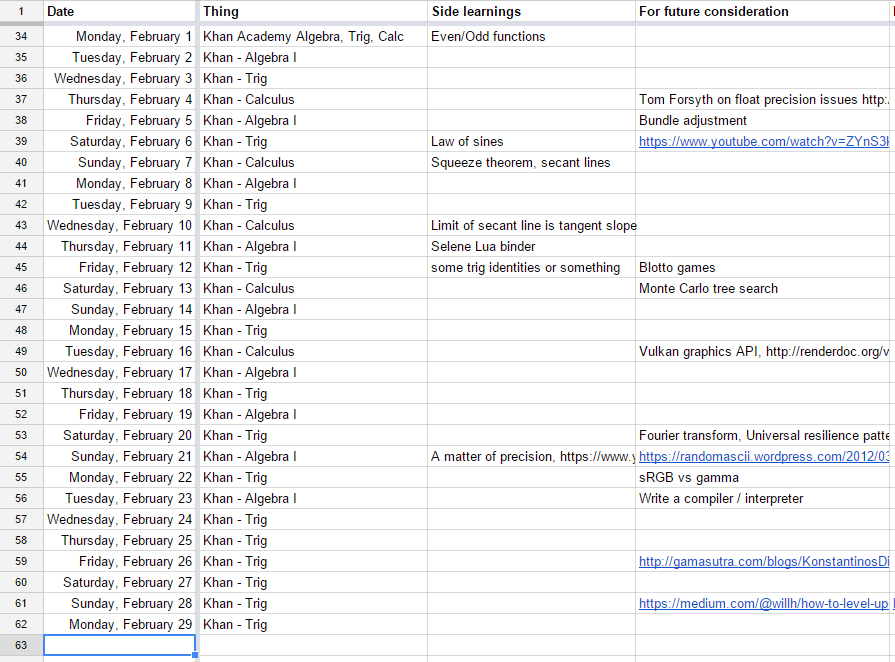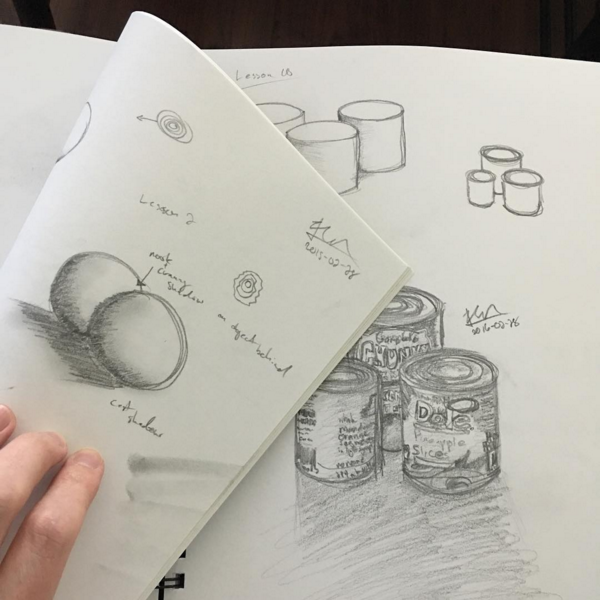Learning Something Every Day of 2016: February Report
After two months, the 30 minutes of learning every day has become routine enough that I don’t really notice it. It’s just a thing that I do, the time flies by, and then I have the rest of the evening to do whatever. It no longer feels any different from before when that 30 minutes would have simply been burnt away idly reading twitter or some other ill-defined, unrewarding activity.

The things I learned in February.
You may notice a pattern. While January was a mixed bag with a couple of larger items, February’s learning topics were entirely math focused. I’ve taken Calculus, Trig and Algebra in school, but it’s been 18 years since I’ve studied or reviewed them with any regularity. These fall under the category of things where I occasionally bump into the limits of my knowledge while working, but can generally work around the limitations without substantially improving my understanding of the problem. As I worked through these subjects this month, I could feel gaps being filled, and pieces falling into place where I could have used this information to better solve problems I’ve faced in the past few years.
I still have a long way to go, I eventually decided to focus just on Trig, as that was the one I was closest to mastering all of the content. Getting a win out of the way, and clearing the schedule for more focused study of the other subjects seemed like a good idea.
Previously:
Routine = Useful
While this all makes for a pretty boring list of things learned, I’m happy with it in two respects. First, that my time learning every day has become a typical, instead of novel part of my day. That’s the whole point! Yay! And second, the ability to focus on a single topic consistently has finally allowed me to carve away a substantial portion of a large and long term goal. This is I think a greater acheivement than knocking off individual small items from the great list of things to learn.
Engaging = Useful
I should note that Khan Academy is pretty great, and was instrumental in helping me get through these math subjects so far. I started out with the intent of watching lectures and going the open course work provided by universities such as MIT, but I could tell right from the start that that was going to feel like a slog. At the suggestion of a friend, I tried out Khan Academy and was immediately hooked. The interactive nature and immediate feedback made learning fun! I’m sorry, here’s a bucket… I’ll wait.

Khan Academy Mission Progress
A Challenge Appears
I still have plenty of time to spend some time reading, watch a TV show, and play a bit of Cities: Skylines (I had fun playing The Witness, but my interest petered out around puzzle 200). The After Dark and Snowfall DLCs piqued my interest in trying Cities again. This has presented a challenge in that Cities is the kind of game where you can easily get sucked in and the hours fly by. Suddenly it’s 2am, and while that’s fine for today, it means tomorrow is going to suck. I do my 30 minutes of learning first as always, so I’m not at risk of skipping, but it does mean I’m paying the price of sleep deprivation tomorrow. Part of the idea of spending time in 30 minutes blocks, and to include play time as part of the routine is to avoid this very problem. I should be more mindful of playing for a set amount of time, because I know I can keep playing tomorrow, and will have plenty of time as the days go by to get my fill of the game.
I see this as a remnant of my earlier thinking. Feeling pressured and lacking for time every day makes the urge to binge on enjoyable activities nearly irresistable. I must squeeze every ounce of fun out of this thing as quickly as I can, since I won’t have time Later(TM)! You know, “later” when I’ll be busy working on that important stuff I wanted to be working on. Except it’s rarely later, more often than not it’s right now. So this is something I need to make a point of focusing on. As the work of just doing the basic learning every day no longer feels much like work, I can step up my game.
If I can get the hang of that now, I’ll be prepared when World of Warcraft: Legion comes out and I’m more tempted than every to spend any available free moment on the game. Speaking of which, I haven’t played any WoW in 2016, and haven’t been missing it (much), because I’ve already done all the things I wanted to do with the current content. I knew that already, but without a system of how I was going to use my time, it was a reliable and effortless default decision. I do plan on playing Legion, but I’ll do so if it’s what I really want to do with that time, and not just because it’s something to do with my time.
Checking The List
Here was the plan at the end of January:
- Learn something. Every day: Check
- Watch a TV episode or movie: Maybe 3-4 per week, no more than one a day. Check The Expanse is very good, I may have binged the last few episodes, but only after learning was done.
- Work on my hobby game project: Erm I did work on this, but not regularly. Not surprising as it requires a more concerted effort than other things on this list.
- Play a game I already know I enjoy: Check Cities: Skylines.
- Read a book for fun: Check Three Body Problem and it’s sequal The Dark Forest, both of which I highly recommend. Death’s End is due in August.
- Play a game I haven’t played before: Check Firewatch whose team includes a former Klei colleague Nels Anderson who was designer on Mark of the Ninja.
- Bills and chores and stuff. Check I don’t currently have anything I’m avoiding doing in this regard so let’s call that a win.
A pretty good result. Looks like I’ll need to focus specifically on a dev project in the future if that’s something I decide to take on seriously. Which brings me to the difference having a system makes.
Having A System
I’ve gone through reviewing math phases before, to less success. In particular between leaving EA and joining Klei I was working from home and billing maybe 5-6 hours a day. That left lots of time for things like brushing up on my math. I did ok, but my effort was sporadic and as soon as more interesting things came along to fill up my time, math review got left by the wayside. That was 5 years ago. As February can attest, I’ve been far more successful now that I have a way to approach these kinds of goals.
Yesterday I felt like doing some drawing and did Day 10 of You Can Draw In 30 Days. Turns out that I started working on that book exactly one year ago to the day. Seems like the beginning of the year really is the “let’s improve my life!” season. But last year I didn’t have a plan, or a system. I did a few lessons for a few days in a row and then skipped a day, and then a week, and then a few months. Here we are a year later, and I’ve only done 10 out of 30 lessons.

The 30 days are not sequential
Lesson 1: Feb 28, 2015 - Lesson 10: Feb 28, 2016
Now I have a system. Since learning a thing every day has become a habit, I think I can add on a new plan. I call that plan “Also, Draw Something Every Day of March”. I only have 20 lessons left, so it should be a piece of cake to finish You Can Draw In 30 Days by the end of March.
This means I’ve reserved a full hour out of every day, 30 minutes for learning and 30 minutes for drawing. I can only add so many things, but so far this still seems manageable.
TL;DR
So far so good. Now I’ll try drawing every day too.